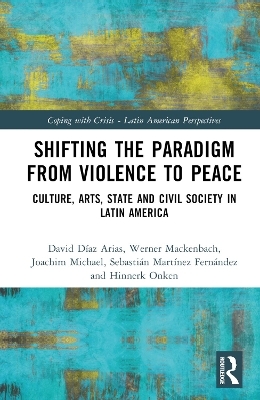
Peace in Latin America
Routledge (Verlag)
978-1-032-85719-0 (ISBN)
- Noch nicht erschienen (ca. Dezember 2024)
- Versandkostenfrei innerhalb Deutschlands
- Auch auf Rechnung
- Verfügbarkeit in der Filiale vor Ort prüfen
- Artikel merken
This volume shifts the focus from violence to peace studies in Latin America, and sheds light on how social groups and individuals resist to violence and strive to create peaceful or at least less violent conditions of conviviality. Drawing on social sciences, history, and anthropology, but also on cultural, literary, and film studies, the book examines the role of social mobilizations, civic activism, and cultural/artistic initiatives as responses to the crisis of violence, which the state is unable or unwilling to address. In this sense, it debates what a culture of peace could mean in Latin America.
Divided into four parts, Part One discusses peace from an epistemological and philosophical perspective. In Part Two, the authors discuss the contours of a culture of peace with a particular focus on literary and cinematic narratives. Part Three analyzes the public debate about the role of the state in peace processes in the case of Costa Rica/Central America. Part Four examines the importance of civil society activities in peace processes.
Peace in Latin America is written for a wide and diverse audience that includes researchers, professors, specialists, students, civil society activists, and political actors not only from Latin America but from all over the world.
David Díaz-Arias is Professor of History at the University of Costa Rica, Costa Rica. He has extensively published about different historical topics including the constitution of populism, social movements, state building, national identity, civil war, peace processes, and memory battles in Central America and Costa Rica during 19th-21st centuries. Christine Hatzky is professor for Latin American and Caribbean History at Leibniz Universität Hannover, Germany and has further expertise in Atlantic history and the history of Lusophone Africa. Her research focuses on decolonisation processes, South-South cooperation, transnational solidarity networks, the history of knowledge, violence and peace processes. She is head of the Center for Atlantic and Global Studies (CEAGS) at Leibniz Universität, co-director of the cooperative network project Maria Sibylla Merian Centre for Advanced Latin American Studies (CALAS) in Mexico and Costa Rica, funded by the German Ministry of Education and Investigation (BMBF). Since 2017 she is part of the EU-funded ConnectCaribbean network. Her publications include Cubans in Angola: South-South Cooperation and Transfer of Knowledge, 1976-1991 (2015) (Book Prize of the Latin American Studies Association, LASA, 2016) and Lateinamerika 1800-1930 and Lateinamerika seit 1930 (both 2021). Werner Mackenbach is Professor of History at the University of Costa Rica, Costa Rica. He is co-director of the cooperative network project Maria Sibylla Merian Centre for Advanced Latin American Studies (CALAS) in Mexico and Costa Rica and member of the International Management Committee of the EU-funded ConnecCaribbean network. His areas of research are the literary and cultural history and the history of thought of Central America and the Caribbean, as well as memory studies of the region. His recent publications include studies on representations of violence and peace in Central American literatures. Sebastián Martínez Fernández holds a degree in philosophy and a master's degree in Inter-American Studies from the University of Bielefeld. He is a doctoral researcher at the Center for advanced Latin American Studies CALAS. Currently is research assistant at the Leibniz Universität Hannover, Germany, where he also teaches. His areas of research are, among others, philosophical and aesthetic perspectives on the relationship between violence and peace, and conservative and nationalist thought. Joachim Michael holds the Chair of Inter-American Studies and Romance Studies at the University of Bielefeld (Germany). He is a specialist in Ibero-American literature and audiovisual culture. His research and publications focus on cultures of peace and violence, the temporal regime of modernity, televisual and cinematographic cultures in Latin America. He has also written about Ibero-American literature of the colonial era and of the 19th, 20th and 21st centuries. Hinnerk Onken is working in the field of Latin American history. Since 2010 he has held positions as substitute professor, assistant professor, and research associate at the Universities of Cologne, Eichstätt, Hannover, and Münster. His PhD-thesis (Catholic University of Eichstätt) in 2011 was awarded the prestigious "Kulturpreis Bayern".
Introduction: Shifting the Paradigm from Violence to Peace in Latin America 1. The Epistemological Foundations of Peace Studies 2. Culture, Arts and Peace in Latin America 3. State Politics, Public Opinion, and Peace: A Case Study from Central America 4. Civil Society and Peace: Four Case Studies from Latin America
| Erscheint lt. Verlag | 30.12.2024 |
|---|---|
| Reihe/Serie | Coping with Crisis - Latin American Perspectives |
| Verlagsort | London |
| Sprache | englisch |
| Maße | 152 x 229 mm |
| Themenwelt | Geisteswissenschaften ► Geschichte ► Regional- / Ländergeschichte |
| Sozialwissenschaften ► Ethnologie | |
| Sozialwissenschaften ► Politik / Verwaltung ► Europäische / Internationale Politik | |
| Sozialwissenschaften ► Soziologie ► Spezielle Soziologien | |
| ISBN-10 | 1-032-85719-6 / 1032857196 |
| ISBN-13 | 978-1-032-85719-0 / 9781032857190 |
| Zustand | Neuware |
| Haben Sie eine Frage zum Produkt? |
aus dem Bereich


